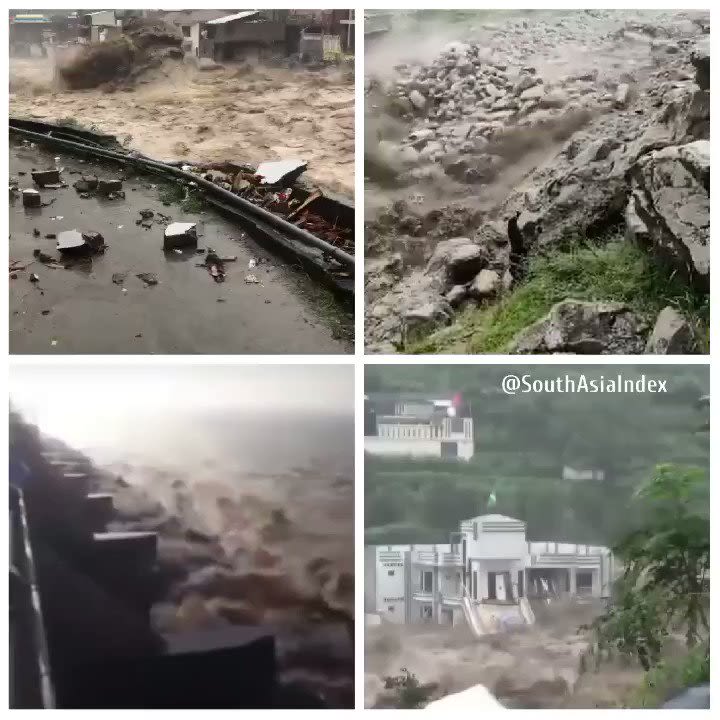A combination of heavy monsoon rains and melting glaciers has caused devastating floods that have killed more than 1,100 people and have left a third of the country under water. The Pakistan floods are not an isolated incident for the back page of your newspaper. The scale, and relevance for all of us, should make this the main headline wherever you live.

This summer was marked by extreme weather events all over the northern hemisphere. As a reader of this newsletter, you have likely experienced this too. For instance, many European readers will remember the record-breaking drought in Western Europe. At the same time, many American readers will also have experienced the extreme heat and drought in large parts of the United States. There have also been severe droughts in China, while there was flooding in Japan and South Korea.
It took the western media quite some time to realize how extreme the situation in Pakistan was. Although Twitter was fast to warn the world, the reporting was unreliable since some accounts posted videos from years ago. Then the British media followed, and only then did the leading U.S. newspapers write about the floods. We can blame the media for an initially slow response since there is the uncomfortable feeling that people suffering in non-western countries get less attention than those in the west.
But on the positive side, I notice that the media increasingly writes about the bigger picture of a global climate crisis that manifests itself all over the world in different forms of extreme weather but that are interconnected. For example, air moisture in a drought area is diverted to another region, which can cause a downpour. Increased atmospheric temperature by one degree celsius leads to an increase of some 7 percent more water vapor in the atmosphere. Large-scale climate disasters in non-western countries are often linked to weather extremes like droughts that we experience. And although there is no one-liner cause for the floods in Pakistan, where a complex set of factors is at play, the floods are worse because of the climate crisis that melts the country's glaciers and increases rain during the monsoon. And Pakistan's contribution to the production of greenhouse gases that cause the climate to change is minimal.
We are all living in the early phase of global climate change (yes, it will get worse, and much worse if we don't act). So we are in the same boat, and it's sinking. To keep it afloat, we have limited time, and we have to work together. And since the ones in our boat responsible for the disaster are the same ones in a better position to provide help, the Pakistan floods must get maximum media attention in the west.
Pakistan's terrible experience today will be ours tomorrow unless we, all of us, will very soon take efficient large-scale climate action. So for those that don't feel a moral obligation towards other countries, there is at least the self-interest argument: our boat is sinking, which means your future is also at stake.
Scientists agree that the worst of climate change can still be avoided if we don't waste any time and massively scale up our actions. Perhaps each of our own experiences this summer, and the hard-to-watch pictures from Pakistan, will convince more people that their governments should prioritize climate action to save our planet. If you read this, you will likely live in a country where you have a vote; use it for a better planet.






Thanks for writing this!
Awful pictures and numbers out of Pakistan.
We can certainly vote here. Different things on the ballots I just voted on. Green parties are gaining a lot of ground, but it's not enough.
(And you don't want to know what we're discussing right now ... no real action, just short term "solutions". Like we're meant to take cold showers and shower with sb else - so we don't use as much hot water. I wish I was kidding.)
These images are horrifying! Like all the disaster films we’ve seen have become reality. It’s unimaginable, especially for those experiencing it first hand. Seeing the power of enormous floods of water rushing with enough force to crush large buildings and wash them away like bits of rubbish in a gutter.
Looking at the inconceivable figures is irrefutable evidence that the predictions we’ve been warned of for years are now before us.
As you stated, “Pakistan’s terrible experience of today will be ours tomorrow unless we, all of us, will very soon take efficient large-scale climate action.” It’s essential that everyone, individually and collectively, accept the challenge to keep our global boat afloat. My country is finally beginning to make climate progress but we’re far behind and challenged by greedy lawmakers who impede progress.
Thank you for using your important climate voice in this excellent article to once again ring the bell for urgent action while there’s still time to avoid the worst.